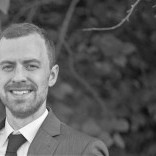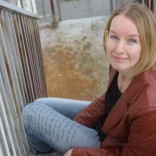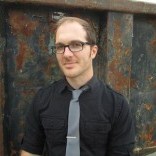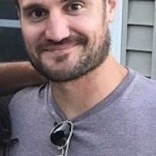Snake in a Can
Dustin M. Hoffman
You slam shut the rusted door of your Corsica and survey Wiley and Norm’s homemade shooting range. This was their idea, to meet on their home turf. You laugh at their tiny .22s aimed at a bullet-scarred tree stump. Lined on top: six twinkling silver cans. One plunks into the dead-yellow winter grass. Out spills a brown field mouse, its lolled tongue trickling blood.
You holler at Wiley and he pretends not to hear you, shoots again, hits air. Fuck that. You don’t put up with that. There’s no ignoring you. That’s what your mama said when you hit two hundred pounds in fifth grade. Just look at you, your mama said. No one can deny such a giant boy. No one can ignore Christian Collin Huff, your mama said.
You don’t bother hollering again. The Scarborough brothers aren’t shit. You barrel closer, closer, and nothing could stop you. Not that rifle shot. Or that one. Not the bullet’s ping off another can. Not the string of hot-red that spurts out the silver can, sparkling in the sun. You strong-walk behind Wiley, squinting, thinking, No one, no one, no one, no one, no one ignores Tack. This is the name you made, the name you gave yourself the day you hit three hundred pounds and beat the shit out of six-foot-nothing Tall-Ass Toby for calling you Prissy Chrissy and saying your mama’s pussy must have been wide as barn doors to spew you out. You knocked Toby flat and buried your knee into his throat, sunk your weight upon his trachea, until he finally squeaked out your new name.
You step in front of Wiley, in front of the rifle propped against his shoulder, his eye peering at you through the sights. “Bang,” he says, his finger laced through the trigger guard. You pull the barrel, Wiley and all, tuck the muzzle against your nostrils, smell the oil and metal and sulfur. You wait. He keeps aiming. You feel little brother Norm’s rifle press into the folds of your neck, and that’s how scared these boys are, threatened by a man with a gun up his nose. More scared than you. And you are. You’re embarrassed by the flutter of your chest, wonder if they can see it patter through your open coat, your thin T-shirt that fails to guard against winter’s bite or your tattletale heart. You don’t want a bullet up your nose, brains slurried into mashed potatoes. You’re not crazy enough to hold a gun to your own head, but that’s how crazy Tack must be. The Tack no one can ignore.
“You wanna shoot something that matters, now’s the time,” you say, still gripping the barrel. A sweat bead forms on Wiley’s nose. His hot fear will freeze in half a second.
Wiley lifts his head from the sights, drops the rifle into your grip. He moves past you and shoves his brother. Norm whines, “Shit,” as he tumbles onto his ass.
“We’re just fucking around, dumb-ass,” Wiley says to his brother. “Tack and me might as well be blood.” He slaps your back. “We’re like family, goddamn triplets.”
Wiley offers up his palms. They hover, glisten, waiting for you to return his rifle.
“That would be one ugly-ass mother to make all three of us,” you say. You cock your arm back, swing, and sail that stupid rifle into the brush.
Wiley shakes his head. “I offer brotherhood and you shit in my hand.”
“I don’t need a brother. What I need is exactly 375 dollars, ‘cause somebody bought a bunch of fucking yayo and didn’t pay.”
“Don’t be such a bitch, you tubby-ass mother fucker,” little brother Norm says. He’s still got his rifle and he feels big behind it. He’s too young to know the history of Tack, doesn’t remember the day Tack put the tip of Simon Saltamacchia’s index finger through the band saw in shop class. Simon told the teachers it was an accident, but every single kid in that school knew it was you, learned that’s what you get for stealing from Tack. Simon’s blood splattered onto your upper lip, almost made you puke. But you didn’t. Every pair of safety glasses in shop class watched Tack lick his lip clean.
“We were gonna pay,” Wiley says. “We were gonna until our old man found your shit and shoved it all up his nose.”
“My shit?” you say. “Your shit went up his nose. The second the baggie dropped into your pocket that was your shit.”
“It’s no one’s nothing now. And if you want your money, you should go whip the shit out our pops.”
“You want me to beat up your old man?”
“He’ll be home from the refinery in two hours,” Wiley says.
“Fuck, we’ll help.” Norm hops on one foot. “Beat him with a switch, smack his shins with a two-by-four, crack his knuckles with a hammer. You just gotta start it, surprise him. He won’t see it coming from you.”
Dads are a thing you don’t know. Yours, never met him. Your best friend Hector’s disappeared long ago, before either of you sprouted pubic hairs. You almost became Daddy until Jenny Rios slipped off to the doctor and scrambled her baby without telling you, without asking. Nope. You don’t know anything about dads, and you don’t have two hours to wait for one. Tack never has two hours to waste.
So you punch Wiley in the nose. Down he goes. Norm jumps onto your back, hangs around your neck, squeezing. And it’s sweet, how Norm is huffing and puffing more than his bloody-nosed brother. That’s brothers. That’s how you feel about Hector, and you doubt these two feel it any harder just because they have the same blood. Norm’s skinny arms strain around your neck. You want to laugh, but it’s too hard to breathe. Squeeze tighter, you little fucker, you think. It won’t make a difference. If you pass out, then what? Their daddy gets home and sees your fat, passed-out carcass, and he puts a bullet in your eye since his boys can’t. Then he teaches them how to saw off limbs proper, how to make a body small enough to stash in the woods. But what will they do with your giant, unsawable torso? Tack is impossible to hide.
You’ve had enough of Norm’s skinny-armed noose. Let yourself fall. No hesitating, no bracing. Slam on top of Norm and pop his chest. He wheezes underneath you, shoulders twitching.
“Get off him.” Wiley stands over you. “Get off my brother, Tack.” He reaches into his waistband, and, surprise, another gun, but not one of those hick pea-shooters. A handgun. A Glock. A .45 ACP. You can tell from the octagonal rifling. A fine piece of modern weaponry to die by. You’d be happy to shake Mr. Gaston Glock’s oily hands and let his craftsmanship rip a bullet through your skin.
You grind your back into Norm. He pushes out a muffled scream, hot against your skin. You smile up at the beautiful gun and wait for that pussy to squeeze the trigger.
“It’s yours.” Wiley flips the gun around, handle pointing to you. “Just let my brother up.”
You never had any interest in a rifle. By the time a boy in Alma, Michigan gets his first boner he already has a rifle and a shotgun and a crossbow sitting in his daddy’s gun case. But this piece, this Glock, that’s something not every hick owns. That’s something for boys in the city, boys like your hookup Popo. You can hide this piece in your waistband, let the cold metal brush the base of your dick. Tack will piss gunpowder, spit bullets. The unavoidable giant will now pack heat, end lives. The thought chills your thighs. That’s a Tack there’s no coming back from.
You roll off skinny Norm, and he’s heaving, making a scene. He whines and groans as he crawls to the target practice stump. Wiley slides the Glock back into his waistband, offers you his hand. You don’t need it. Tack helps himself, even if it’s a slow process. Greatness takes time. You roll onto your belly, push onto all fours, raise to your knees. You stand like a grizzly bear.
“Give me the fucking piece and you can owe me two hundred.” You watch the Glock’s handle gently bobbing to the rhythm of Wiley’s breaths. A swath of underbelly flashes over his low-riding jeans, a wink of flesh, and below that his dick. You make yourself stare at the ground.
“Not yet.” Wiley folds his arms. “Let’s make a deal.”
“I gave you a goddamn deal.”
“One more.” Wiley smiles. “You’ll like this.” You could just grab the gun. You could blow him away in seconds. His brother, too. The lazy Alma cops would pin it on their dipshit father. “We shoot for the gun, and the money.”
“Shoot what?” you ask, but there’s your answer. Norm is already picking up a fallen can, stuffing the mouse corpse back inside.
“We shoot rifles, and whoever hits more cans wins. You win, you get the Glock and we owe you the full. I win, you get nothing. And you beat the hell out of our old man.”
“Jesus, with the old man again?” you say. “That’s worse than double or nothing.”
“But if you lose, you could still win. If Pops hasn’t blown all his paycheck buying shots at the PK, you keep what’s in his pockets. Whatever you find.”
You agree, because what the fuck. Nothing ventured. That’s what Popo would do. That’s what Tack does. Take chances. Wiley yells to his brother to fetch the rifle, the one you chucked into the brush. Norm reaches into his shirt pocket, pulls out a shotgun shell, jams it against his nose and snorts. He howls, hops onto the stump and then into the air, sprints toward the brush. Now you know all that cocaine isn’t gone, that they lied, that they’re stashing it in shells.
“I thought your daddy blew your stash.”
“What you gave us,” Wiley says, “yeah, that’s long gone.” He reaches into his own breast pocket, pulls out another shell. “This is different shit. Want a bump?”
You take the shell, dip your finger, rub it under your tongue. A shock of numb, blood-pulse flash. Not your shit. Too good for what you would give the Scarborough brothers. You cut your shit three times for stupid hicks like them.
“I get this, too,” you say, “when I win.”
“Sure.” Wiley slides the shell back into his chest pocket. “But first you have to shoot.”
Norm yowls again, hoots, springs out of the brush championing the rifle over his head. He serpentines toward you, diving and rolling. He pushes the rifle butt into your gut. He makes a bodoom sound like you’re a rubber swimming pool full of pudding. You grab the rifle.
“You first,” Wiley says. “Our guest.”
You tuck the rifle into your shoulder, press your cheek against the wooden stock, squint down the sights. Hector let you shoot his BB guns when you were baby kids. Your first and only rifle, unlike all the other boys in Alma nailing bucks with their fathers. You aimed at GI Joes: Buzzer and Bazooka and Shipwreck and Dr. Mindbender and Beach Head and Snake Eyes and Torch who looked like a gay biker, and, of course, Lady Jane, who you both always managed to miss. You couldn’t bear to crack the plastic sternum of the only female in a world of plastic men. You remember the day you blew Quick Kick’s snap-action legs to hell. You landed a perfect shot, dead-center on his dick, and the legs went flying. That was also the day you realized all your misses had been bouncing off the fence, ricocheting to dimple Hector’s dad’s rusty Mustang. He punched Hector in the face when he found out, right in front of you. That day you decided you were lucky you never met your dad. Fuck dads. You squeeze the trigger, and the rifle jams into your flesh. You don’t hear the ping of metal, or even the thud of pierced stump bark. You missed completely.
Wiley shrugs. He aims, exhales a shot. A tin can plinks to the grass. You hear chirping, a sick shriek, like a sparrow set on fire.
“Pick that shit up, Norm,” Wiley says. Norm takes another bump, slips the shell in his pocket, sprints to the stump. He rescues the tin can from the grass, pokes his middle finger. The can shrieks louder.
“Bat,” Wiley says. “Rubber-banded its wings, after we found it flapping around the fireplace. Thing had a death wish.”
Norm slams the can back down, punches a thumbs-up at you. You aim at the bat. You could put it out of its misery. You could kill any number of mystery critters. Instead, you aim at the mouse carcass, the one you know is dead. Aim, squeeze, miss. At least this time you hear the thwack of bullet striking wood.
“Rough luck, Mr. Tack.” Wiley steps toward you. He could touch you. Instead, he shoots, pings another can. Norm instantly snatches it up, smacks it back on the stump. Red drips from the bullet hole onto his hand. He swipes it across his cheek.
You aim again, prepare for another failure, but Wiley stops you. “Norm, sit your ass in front of that stump there,” he yells, and his brother does as he’s told. “You better bump it deep, brother. Make yourself Superman.” Norm jams his shell up his nose.
“Can’t shoot shit.” Wiley inches closer to you, puts his hand on your back, whispers in your ear, “Hit a man or hit a can or just miss everything.”
You’ve fucked up some kids in school, but you’ve never shot a non-plastic man. Even those tiny fake ones, even then, you felt a twinge of something. A flush at the back of your neck, a tug at your testicles. You’re soft, is what Tack’s dad would say, if you had one, you guess. And now, what do you feel? Wiley’s hot hand glued on your back. Your heart gurgles, squeezes. A drop of sweat plummets down your shaved scalp. Winter’s freeze instantly ambushes that wet swipe.
But you don’t get scared. New things don’t scare you because a new thing is just an old thing waiting to be done. Killing a Scarborough might be part of Tack’s great path. Killing him won’t kill you. If you do it, you’ll just keep going. Kill Wiley, kill their dad, drive south as fast as you can. No one can catch you once you start rolling because you weigh three hundred twenty-seven pounds and your mass cannot be stopped once in motion. You’ll rip a hole through the sky and turn it black, and that black hole will suck in the rest of the shitty world. You’re one of those roving black holes you learned about in the last science class you paid attention to. You sneak around the galaxy, swallowing planets and stardust and time.
You aim above Norm’s too-large forehead, at one of the last two cans. Virgin tin. Something breathing and squirming inside. You aim lower. Norm grins and flips you off from across the dead yellow field where snow refuses to fall but everything freezes. His chest heaves.
You squeeze.
You miss.
You hit the can.
You are no roving black hole. Not yet. Norm is hooting one long note like he grabbed the sound by the tail and won’t let it go. It rings like laughter through the winter-naked birch trees.
“Pick up that fucking can, you lazy shit bag.” Wiley fires at his brother’s sneakers. Norm laughs then hops up to retrieve the can. You can’t black-hole-swallow their existence and you could never beat them at shooting. Tack should beat everyone at everything, but God is unfair and shortsighted. God is another father you don’t know. The wind sways the stripped stick trees, and the clouds part. A sun sliver spears you. Only you. There’s no warmth, only blinding light. If you can’t win this way, try that way, the sun’s stab says.
“Oh shit, oh fuck. Gone, gone, gone,” Norm says. “Got an empty can here.”
“Shit.” Wiley trudges toward Norm. “Better not lose Gretel. Watch your fucking shins, boys.”
Past the stump, where you felled the can, the brothers skid their feet through the grass. “Tricky-sly son-o-bitch. I hate that damn snake,” Norm says.
They’ve forgotten about you, about Tack, even as your density dimples the earth beneath your feet, threatens to tear it. But this is good, just this once, to be forgotten for now. A blessing, a miracle. A giant made invisible.
Wiley drops to all fours, his ear to the earth. You approach, study his pale fingers knifing through yellow blades. Wiley’s ass points toward you, and in the waistband of his Hanes underwear, the Glock protrudes. You glide quiet as ghost-breath, slick as the snake that slithers through your legs. You freeze just long enough for its tail to sweep-flick under you. Then it’s gone. Something inside you shudders, smiles, opens up. The snake is gone but it engraves itself. Red and yellow and black. An ancient pattern of colors you feel in the marrow of your spine. The echo of caveman death. A death you died ten thousand years ago that made you Tack the black hole today. That snake is your gift, and you are filled all over again with the Fearless. No Scarborough or .22 can hurt you. There is so much of you that you collapse, implode, disappear. You hide power, like your brother snake, slip right through their legs.
You lean down, yank the Glock from Wiley’s underwear. Your knuckles glance his ass crack, skim the skin of lower back. Wiley’s hips freeze.
“Not yours, not yours,” Norm says. He’s spotted you, is moving his hand toward the knife on his hip. “We got a cheating cheater here. Wants a prize with no win.”
“Shut up, Norm. He shot Gretel down. That’s close enough. We’ll let him win.” Wiley holds up his palms. “And he lost his money, which he ain’t getting back. So this gun is what you get. All you get.” Wiley holds his hand out to you from where he squats. You don’t shake on this deal. You back away, slide the gun into the front of your waistband, but the barrel doesn’t touch the base of your dick. You are too giant. Your stomach, your mass, is too great. You keep backing away, keep your eyes locked on the brothers who are up and stalking. Your heel lands on one of the .22s. You pick it up, chuck it into the woods. You’re waiting for one of them to sprint toward you or one of the guns, and then you’ll shoot, and the snake will spring out of the yellowed grass and strike. But nothing happens. The winter world has grown quiet, waiting. The wind doesn’t blow, the trees don’t sway, the dead grass is too afraid to crunch under your feet. They can’t unwatch giant you.
But the ground whispers, and your eyes follow the silent-scream of those red and yellow stripes again. Right beside you the snake follows. It could have gone anywhere, but it has chosen you. We are two poisons, it says. We are both death so dense we turn invisible. It circles your sneakers, figure-eights between your feet. Every scale glistens in stabs of sun.
You know it won’t bite you, because your bullet pierced its can but missed its body. And you’ve already died by its way, in another life. Adam and caveman. The fallen and the stupid. Amen. And fuck them. The snake has come this time to help you escape. You bend and snatch the snake’s tail and hurl it at the brothers. It slaps Norm’s face and he screeches. He scrambles to shake it off. His brother slaps at the snake.
You depart to your Corsica. You leave these two idiots who still owe you money. If the snake kills one, you’ll forgive the debt. Tack will own that death, be bigger still, so everyone will know. You don’t feel guilty about that happening. You don’t feel stronger. It’s just a natural slipping off of skins so Tack can grow. Michigan’s frigid winter doesn’t feel as bitter against this new stretched skin.
You squeeze into your driver’s seat and feel a pinch. The gun presses into you. You place it next to you in the passenger’s seat. Your prize. You are a winner. These are your stripes of red and yellow and black. You will engrave your history, until your story swallows all and then yourself. You are all and everything and nothing. You are Tack.







